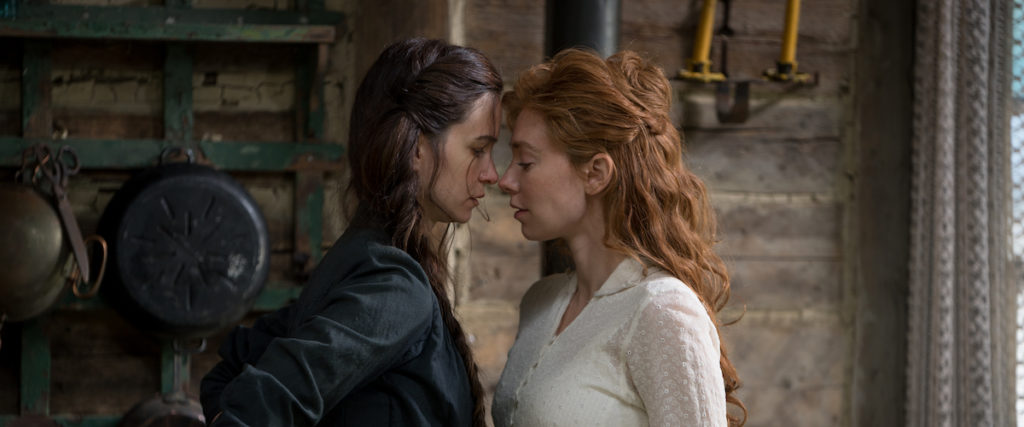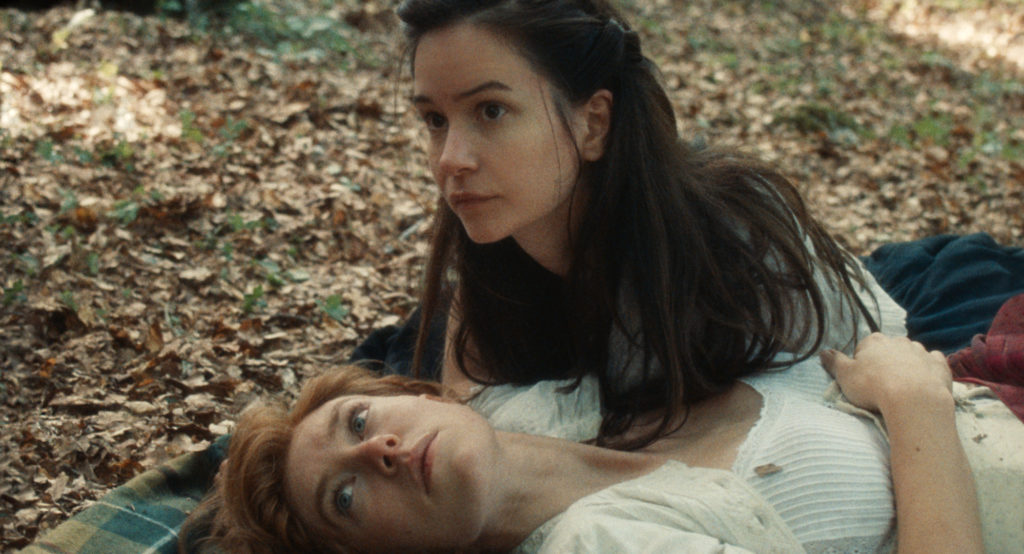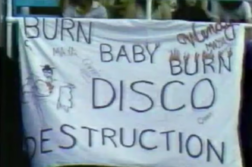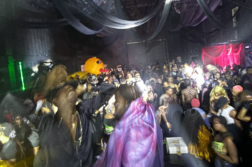
The World To Come (2021) takes a contemplative look at a love affair between two women living in relative isolation in the mid-1800s. Directed by Mona Fastvold and adapted for the screen by Ron Hansen and Jim Shepard from a short story by Shepard, the film explores longing and power through a forbidden romance. Fastvold herself has been involved in some very interesting projects, from her complicated directorial debut The Sleepwalker (2014) to co-scripting a study of circumstances that led a child to become a remorseless dictator in The Childhood of a Leader (2015) and co-plotting Vox Lux (2018). The World To Come takes us into different territory entirely, but in doing so, it expands the emotional resonance of her previous projects.
Abigail (Katherine Waterston) lives with her husband Dyer (Casey Affleck) on a lonely farm in upstate New York circa 1856. Their lives are beset by hardship, and they both remain in mourning over their daughter, who died at a young age. While Dyer wants to move on, Abigail has changed on a deeper level. It’s questionable if she ever loved her husband—the arbitrary nature of marriage in this time period is highlighted when she explains casually how they met and wed without necessarily forming an interest in one another first. Dyer’s work on the farm settles him into a comfortable, if exhausting, rut, but for Abigail, she loses herself in memories of her deceased child and struggles to see a “better world to come.”
Her spirits change for the better when a new couple rents a farm nearby. She befriends Tallie (Vanessa Kirby) who seeks refuge from her increasingly violent and hostile husband Finney (Christopher Abbott). Despite Tallie’s comparatively sophisticated demeanor, she doesn’t tease or look down on Abigail, and they find themselves opening up to each other more and more. They fall in love, and while Dyer suffers mild jealousy, Finney is driven to a rage and steps in to prevent Tallie and Abigail from seeing one another. As he realizes the true nature of their bond, he grows to despise Tallie.
Spoiler alert: Major spoilers for The World to Come follow. If you haven’t seen the film and don’t want to be spoiled, bookmark this page and return after you’ve watched it.

The nervous, emotionally-charged chemistry between Tallie and Abigail is incredible, with the sort of joyous-yet-hesitant feel of first love portrayed expertly by the actors. The poetic, sensual dialogue between them is charming, but gives the added effect of telling the audience how much they think of one another in their alone time, how they’re crafting things to say—and not saying them out of apprehension that their feelings of love are unrequited. When they disclose their feelings to one another, their characters evolve from the morose and relenting women we meet them as to the defiant and even, at times, ecstatic lovers we come to know by the film’s end.
Their connection is only accentuated by their comparative lack of interest in their husbands. Dyer quickly fades into the background like a piece of furniture in comparison to the lively, talkative Tallie. The dynamic between them is only interrupted by the raw hostility of Finney. His abuse of Tallie manifests in believable, frightening ways. We immediately see what kind of person he is when he talks about forcing a dog to freeze to death for disobeying him. Though Abigail very clearly voices her belief that what he did was horrible and wrong, Finney appears to not even hear her. He is convinced that he has done the right thing even when that thing is completely inexcusable, and that informs his interactions with his wife.
As Abigail is lost in dreams of love with Tallie, Tallie is governed by a secret, unspoken fear that she will never escape her husband. A big part of their story involves him becoming infuriated with her for not wanting to sleep with him, and the film delves into dark territory when we see her locking herself away to escape him. Her relationship with Abigail becomes strained, and the two are forced to part. Despite their adoration of one another, Abigail finds herself unable to help Tallie.
Waterston noted in an interview with IndieWire that her voice overs had been meticulously planned and rehearsed over months, and these whispered, intentional diary entries and letters are a big part of what makes this film as compelling as it is. The importance of letter-writing and journal entries has great historical precedence for the era of “romantic friendships” between women, and sometimes the only trace of queer people’s lived experiences is found in their own words. It’s significant that Abigail is the narrator, not only because her nature is quiet and restrained and it gives voice to her emotions, but because her husband wouldn’t have destroyed her letters while Tallie’s husband would have naturally eradicated all evidence of her queerness.
Much of the story is conveyed via Abigail’s self-reflective moods rather than a strict plot, and the film is best viewed as a brief interlude into her inner world rather than an exercise in morality or a love story. Indeed, there are no easy answers here, and Abigail is thrust back into her lonely soul-searching by the end. Daniel Blumberg’s soundtrack (featuring Peter Brotzmann, Josephine Foster, and Peter Noble) goes from gentle but darkly moody vibes to unnerving avant-garde and back again. Alongside Abigail’s breathless and melancholy voiceover, it compounds on the emotional impact of this ode to her lost love as she struggles to find some balance between the mania of love and the grief of loss.
This is a tragic story, but then, so many stories are, and the painful conclusion of the narrative serves a greater purpose. As profound as her and Tallie’s love story would ultimately turn out to be, Abigail lives in her fantasies and memories. Her introspective demeanor would belie so little of what lies within, but with The World To Come, we are allowed to listen in on her life, her love, her concerns, and her sorrow, for just a little while.
 Sara Century (she/her) is an artist, writer, and filmmaker who is obsessed with most things. She is good at speaking in public, working for most hours of her waking life, and saying quotable things in casual conversation. She hosts the Bitches on Comics podcast, is an editor with DecodedPride.com, and creates a webcomic with Tana Thornock. Find Sara on Twitter @saracentury
Sara Century (she/her) is an artist, writer, and filmmaker who is obsessed with most things. She is good at speaking in public, working for most hours of her waking life, and saying quotable things in casual conversation. She hosts the Bitches on Comics podcast, is an editor with DecodedPride.com, and creates a webcomic with Tana Thornock. Find Sara on Twitter @saracentury





